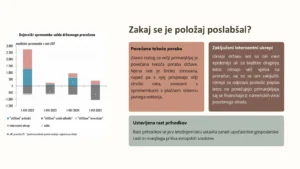“The fact is that through various transfers – whether they be salaries, social welfare expenditures, unnecessary projects, overpriced investments or something else – the government is trying to buy both the media and social peace in order to achieve the best possible results in the upcoming elections,” emphasised economist Dr Štefan Šumah, among others. This comes after the Fiscal Council released its latest monthly report, which shows that the state budget is deep in the red.
From the beginning of the year and up to now, the state budget has recorded a deficit of 1.031 billion euros, while in the same period last year, the deficit amounted to 62 million euros. The government of Robert Golob plans to increase the deficit to 1.85 billion euros by the end of the year. By comparison, last year’s deficit was around 200 million euros. According to the Fiscal Council, the state budget deficit is growing due to higher current expenditure and stagnant revenue growth.
“The main reason for the larger deficit is increased current government spending. Its growth is broad-based, with the largest contribution coming from higher labour costs related to changes in the public sector pay system,” according to the Fiscal Council’s report. At the same time, they explain that revenue growth has stalled partly due to the slowdown in economic activity and partly due to a further decline in revenue from European funds. They emphasised that budget planning should be cautious and allow room to respond to potentially less favourable macroeconomic conditions. “In times of economic uncertainty and major long-term challenges, realistic and prudent budget planning is also essential to ensure transparent and effective management of public funds,” they said, according to the Slovenian Press Agency (STA).
We asked economist Dr Štefan Šumah for his thoughts on the situation, where we’re seeing a deficit of over a billion euros. We were also curious to hear his opinion on whether this is a case of the ruling party intentionally draining the country’s finances before they leave office.
“I watch television very rarely, but since I spend a lot of time in the car, I listen to the radio. Mainly the news, the morning news at 5:30 a.m. and the news at 3:30 p.m. A billion-euro deficit in the state budget at the end of the first half of the year. But there has been practically no reporting on this. This week, I listened to both news shows three times. There was absolute silence regarding the budget disaster. Omerta! And this is a piece of news that should appear daily in all the reports. Journalists’ questions, comments from economists, politicians… but instead, we have nothing. Silence.

Apparently, the mainstream media have been instructed to observe “silenzio stampa.” Yes, it is clearly a case of media blackout, as this news is not exactly common on online portals either (except in truly independent media, which, however, occupy or cover very little of the Slovenian media landscape).
Let’s look at this disaster from an economic perspective. Economic growth is practically at zero, and there is effectively full employment (somewhere around the natural unemployment rate). These two macroeconomic aggregates somehow do not go together; normally, with full employment, we can expect at least minor GDP growth (full employment does not mean that all people are absolutely employed, but that the economy is operating at its potential output, with no unused labour or capital), which did not happen in this case. Instead, the rule was confirmed that additional demand at full employment leads primarily to higher inflation, not to significantly higher GDP (inflation is rising in Slovenia).
However, what is most striking in all this is the deficit in the public coffers despite virtually full employment (and the fact that taxes have been raised). If the economy is at full employment, this means that the maximum possible income (potential GDP) is being generated, the unemployment rate is low, and because more people are working, there are more taxes and fewer social transfers, and the state’s tax revenues are higher. In such circumstances, with “normal” public spending (i.e., without additional increases in expenditure), the state can often expect a budget surplus or at least a balanced budget, because revenue from taxes on income, consumption, and profits is growing, while spending on social transfers (unemployment benefits, etc.) is lower.
And where did the billion go in these “ideal” economic conditions? Some of it probably went to public sector pay rises (because our financial geniuses obviously miscalculated the costs of the pay rises that will result from the “reform” of the public sector pay system, and the rest… somewhere unknown, one part probably went to the paramilitary “brown shirts” of this government, known as NGOs, another part was spent for the increased, often unjustified social transfers, and another part was spent on the luxurious life of the ruling oligarchy… It’s hard to say. But the fact is that through various transfers – whether they be salaries, social welfare expenditures, unnecessary projects, overpriced investments or something else – the government is trying to buy both the media and social peace in order to achieve the best possible results in the upcoming elections.

This government somehow reminds me of the ancient Romans who, after conquering Carthage, burned everything down and then sprinkled salt on the ground so that nothing would ever grow there again! And this government, whether intentionally or out of complete economic illiteracy, is treating the economy the same way the Romans treated Carthage. The consequences will be felt for a long time to come! “Après moi le déluge!” After me, the flood! I don’t care what happens after my ascension to heaven, or rather, after my defeat in the elections, as long as I line my pockets and the pockets of my friends.”


